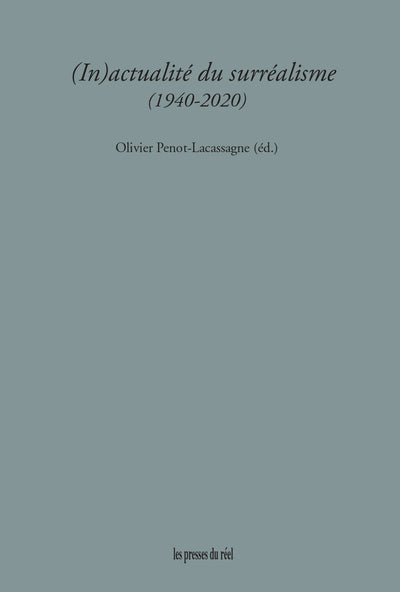(In)actualité du surréalisme (1940-2020)
- Authors: De (auteur) Olivier Penot-Lacassagne
- Publishers: PRESSES OF REALITY
- Date of Publication: 2022-10-11
- Pages: 596
- Dimensions: 240mm x 170mm
Surrealism has long been deprived of part of its history.
literary, art historians have neglected the twenty-five years from
the Liberation to the self-dissolution of the movement in October 1969, and have hardly
looked beyond. One can be surprised so much the years thrown away testify
of ardent poetic, political and artistic vigilance. Surrealism is
then confronts the ebb and flow of a History exceeding borders
national to become global (decolonization, third-worldism,
anti-Stalinism, Cuban revolution, anti-American imperialism, consumerism,
ideology of the Thirty Glorious Years, popular revolts).
Spanning seven decades, this book captures the bitterness of the debates and the courage of the
commitments in which surrealism was involved; it examines the interpellations
of which he was the target, the stories of which he was the object: by the
existentialists, dissident surrealists, communists, lettrists,
the situationists, the telquelians… up to the diatribes of a Jean Clair
pamphleteer who retrospectively imagines its barbarity, at a time – the
2000s – where exhibitions in London, New York and Paris celebrate a
heritage movement and where North American universities speak of "
“total surrealism” in a globalized world.
Edited by Olivier Penot-Lacassagne.
Texts by Frédéric Alix, Marie-Paule Berranger, Christophe Bident, Julien
Blaine, Jacqueline Chenieux-Gendron, Kate Conley, Fabien Danesi, Hugo Daniel,
Michel Deguy, Juliette Drigny, Dominique Drouet-Biot, Jérôme Duwa, Fabrice
Flahutez, Anne Foucault, Emilie Frémond, Louis Janover, Alain Joubert, Jeanyves
Guerin, Audrey Lasserre, Anaïs Mauuarin, Léa Nicolas, Olivier Penot-Lacassagne,
Effie Rentzou, Anna Trespeuch-Berthelot.
Share

